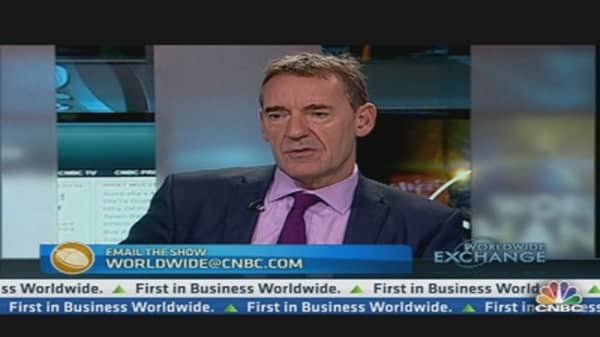The “new China” is poised to become a knowledge economy, where growth stems from the innovation and ingenuity of its workers, rather than the brawn that powered the country’s export-led manufacturing transformation, according to Jim O’Neill, chairman at Goldman Sachs Asset Management.
“We’re in the early stages of China moving to a ‘quality’ China against a ‘quantity’ China, and the winners and losers will probably be very different,” O'Neill told CNBC’s “Worldwide Exchange” Tuesday.
“By quality I mean one in which leadership is happier with seven to eight percent [growth in gross domestic product], not 10 percent, and one in which private consumption becomes a bigger share of GDP. Also, one in which income differentials decline. A China that is focused on energy efficiency and alternative energies and moving towards more creativity and innovation," he added. O’Neill believes China will grow by just over seven percent per year for the decade that began in 2011.
The growth economies — Brazil, Russia, India, China, Indonesia, South Korea, Mexico, and Turkey — will contribute around $15 trillion in real terms to global growth this decade, more than twice that of the U.S. and Europe combined, said O’Neill. China will account for half that sum.
O’Neill acknowledged that the Chinese economy is widely seen as the marginal driver of the global economy, and should have a salutary effect on worldwide growth. He believes global GDP growth will accelerate to over four percent this decade.
But not every country will share the fruits of China’s growth. Australia, so long the principal supplier of raw materials to Asian manufacturers, will suffer as China moves up the development ladder, he said. O’Neill expressed “sympathy” with a colleague who has advised clients to go long on the Mexican peso and short the Aussie dollar .
Australia’s central bank addressed slowing local conditions earlier Tuesday, reducing its key benchmark rate by 25 basis points to 3.25 percent. (Read More: Rate Cuts Are No Threat to a Robust Aussie Dollar: Pros.)
Similarly, sector groups long supported by Chinese interest may become less attractive. “Some of the big global winners of the past decade won’t be the same, such as the big global commodities companies and the big luxury winners … they won’t be quite so prominent. [But] it’s a good time to be a stock picker,” O’Neill added.
The latest data on the Chinese economy showed it continues to remain in contraction as it struggles against the prevailing global macro-economic headwinds and cooling export demand.
Analysts told CNBC that it was unlikely that there would be any further monetary stimulus from the Chinese authorities until after the Communist party conference on Nov. 8 which, this year, will include the once-in-a-decade event of a leadership change.
—By CNBC.com’s Shai Ahmed




